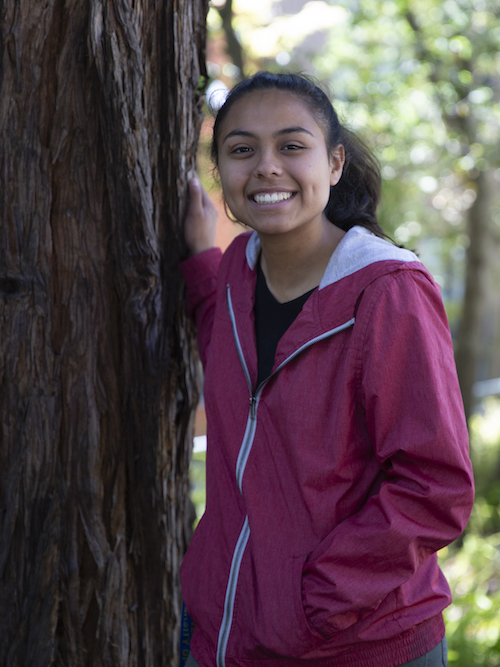Under the mentorship of graduate students, Garay-Solis (Carson ‘20, psychology) works alongside fellow student researchers to study factors of student success for first-generation (the first in their family to graduate from a four-year college or university) and underrepresented minority college students.
As a first-gen student herself, the work is especially meaningful to Garay-Solis.
She uses statistical techniques that she learned in coursework and in the Collab to help see patterns in the interview responses.
“We learn how to run the data for our research group, present them with what we find,” Garay-Solis says. “Then we learn how to describe it so people on campus can know what we’re talking about.”
Under the supervision of Rebecca Covarrubias, associate professor of psychology, Collab researchers study student experiences. First-generation and underrepresented minority students graduate at rates below their peers. Collab researchers interview them to find the structural barriers that get in the way and to assess which practices effectively respond.
One common barrier is the need to work, often at multiple jobs; a response: offering paid opportunities.
Covarrubias’s work has led to workshops for faculty, and the research taking place in the Collab will feed a support structure that all students will eventually receive.
Building solutions
For Covarrubias, who was also a first-generation college student, participation in research as an undergraduate was formative. Her route to becoming involved offers another example of a barrier and effective response: Like many first-generation students, she worked to support her studies, which left little time to pursue research. Then she was selected as a Ronald E. McNair Achievement Scholar, which freed her from needing to work during her remaining school years and made it possible for her to engage in research.
“I wouldn’t have seen research as a possible direction without the support system of McNair,” she says. “I’m research faculty because of the McNair staff, faculty mentor, and the scholar cohort.”
Garay-Solis had read Covarrubias’s work in high school. Then, the summer before her third year at UCSC, she was teaching a psychology class to high school students in her Marin County hometown. She had the students respond to Covarrubias's research on college student mental well-being and the guilt some first-generation students encounter leaving home to pursue higher education.
"It became a great discussion about meritocracy, work ethic, staying connected to our communities from afar, and their general fears about college," Garay-Solis says.
Leading the class, Garay-Solis saw another common barrier first-generation students face: academic materials tend to lack minority perspectives.
“For some of the students it was difficult to grasp why research was focusing on the experiences of brown students,” Garay-Solis said.
She plans to pursue a masters or doctorate in psychology and hopes to provide analysis that influences legislation. Meanwhile, Garay-Solis is excited she’s contributing to UC Santa Cruz’s support for first-generation students.
“I think some of the things we’re doing will be incredibly impactful,” she said. “It’s not just going to help students in the distant future, it’s going to help in the next two years. It’s going to help me.”



